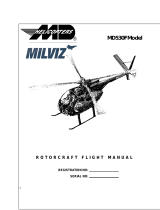190-01226-06 Rev. 3 RFMS, Garmin 400W Series GPS/SBAS System
Page 12 of 12
instrument panel or avionics console is allowed to toggle Reduced Protection
mode in the same manner as using the Terrain Menu selection.
HTAWS INHIBIT
The “INHIBIT” menu on the terrain page is used to inhibit visual and aural
HTAWS terrain and obstacle alerts. VCOs will still be provided. HTAWS shall
only be inhibited if the pilot is certain of the ability to maintain separation from
terrain and obstacles.
HTAWS TEST
The “HTAWS TEST” menu selection on the Terrain Page is used to activate a
manual test which verifies proper operation of the aural and visual annunciations
of the system. The aural message “HTAWS System Test, OK” is played if the
system passes the test, if the system fails the test “HTAWS System Failure” is
played. HTAWS test is only available while on the ground.
VOICE CALL OUTS
Voice callouts (VCOs) provide voice annunciation of the aircraft height above
terrain when that altitude is descended through. VCOs may be enabled by the
pilot in 100ft increments from 500 feet above ground level to the surface.
Selecting the altitude above ground at which VCOs begin is accomplished using
the Voice Callout Selection under the AUX Setup 2 page.
HTAWS ANNUNCIATORS
When HTAWS is installed, HTAWS Mode and Status annunciations are
provided at the lower left corner of the HTAWS enabled GNS 400W unit. In
addition, HTAWS Mode and Alert annunciators external to the GNS 400W will
be present.
If an optional G500H system is installed in the helicopter then all HTAWS
mode and status annunciators from the GNS 400W will be provided on the
Primary Flight Display of the G500H.
If no G500H system is installed, then two HTAWS mode and status
annunciators from the GNS 400W will be installed in the eyebrow panel
adjacent to the aircraft annunciator panel. One annunciator provides visual
alerts for HTAWS warning (red) and caution (yellow) conditions. The second
annunciator indicates whether HTAWS protection is being provided by means
of a dual color HTAWS N/A indication. When HTAWS N/A is illuminated in
amber HTAWS protection is not being provided as the result of either a system
failure or loss of a required input. When HTAWS N/A is illuminated in white
HTAWS protection is not being provided as the result of either automatic
inhibiting below 30 knots groundspeed or pilot inhibiting of HTAWS alerting.












